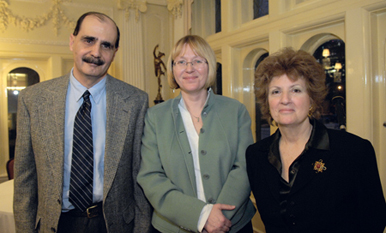Lessons to Lessen Drug Abuse
New SSW center measures success of community rehab programs

Faculty from the School of Social Work who specialize in addiction research have long served as a resource for community health-care agencies that treat substance abusers. Now these agencies, which need to know whether their programs are working, can find help more easily through a new center at the school. The Center for Addictions Research and Services (CARS), which brings together 13 SSW professors, collects and analyzes data on program effectiveness and trains staff based on the findings.
“The center will enable the School of Social Work to partner effectively with community organizations and with other disciplines within and outside of BU to produce cutting-edge research, training, and services,” says Gail Steketee, SSW dean ad interim.
“A major thrust right now is research and program evaluation,” says Maryann Amodeo, CARS codirector and an SSW associate professor of clinical practice. With more federal and local support for addiction services comes increased interest in measuring how effective these services and organizations are.
“Organizations are interested in making use of those funds, but they generally don’t have the staff who understand research,” says Amodeo. “So they look to the School of Social Work to understand what data need to be gathered and how to interpret that data.”
The new center will make it easier for community agencies to find the help they need. Previously, they would call the school’s receptionist to ask which professor specialized in staff training or research plan development. “The receptionist wouldn’t know who to refer the caller to because we each do some of those activities,” says Lena Lundgren, director of CARS and an SSW associate professor of social welfare policy. “This way we’ve centralized our activities more.”
The center’s faculty focus on substance abuse issues affecting individuals, families, and communities. Areas of research include the role of substance abuse treatment in preventing HIV/AIDS, the services that substance abusers use, the factors affecting access to substance abuse treatment, the ways parental substance abuse affects children, the racial and ethnic disparities in substance abuse treatment, and the effectiveness of substance abuse training.
“What makes us unique is our capacity to work effectively with the community and to bring in large grants to the community,” says Lundgren. For example, she is working with Boston-based Casa Esperanza to enhance its residential drug treatment programs and to study the services’ effectiveness. As a result of the collaboration with CARS, according to Lundgren, Casa Esperanza has received more than $1 million in grants to provide trauma counseling and substance abuse services to area Latinos.
Other recent grants have enabled SSW professors to train local employees in quantitative, evidence-based practices. With funds from the National Institute on Drug Abuse, Amodeo helped staff at four addiction treatment programs identify areas that needed improvement and work on a plan for change.
“Some staff may have a resistance to gathering data on clients,” says Amodeo. “We help the agency to understand the purpose of research — that it won’t harm clients and that it will benefit the organization in the long run.”
Lundgren hopes the new center will strengthen ties among SSW professors and give them more opportunities to mentor students and junior faculty on substance abuse methodology and to work with federal grant-makers.
“As a group we have been effective in writing and publishing on addiction, HIV, and substance abuse treatments,” says Lundgren. “The center will make sure that research and publications reach a broader audience, because we can be more systematic in how we disseminate information. We can be more effective in grant-making because we can draw on each other’s expertise.”
Catherine Santore can be reached at csantore@bu.edu.